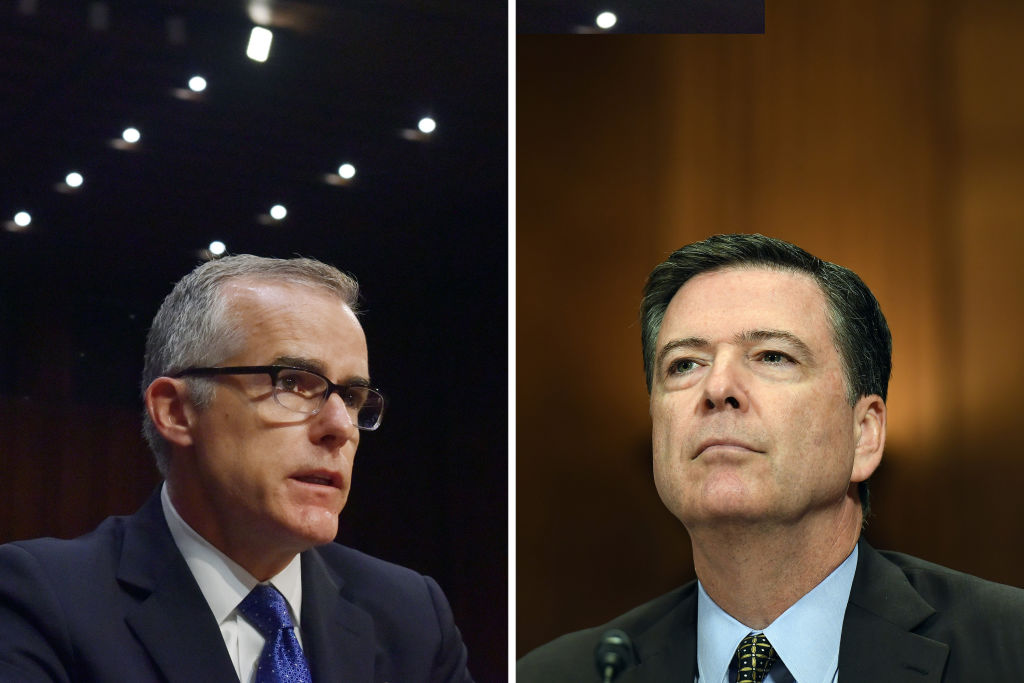Trump's IRS subjected ex-FBI leaders James Comey, Andrew McCabe to very rare invasive audits


A free daily email with the biggest news stories of the day – and the best features from TheWeek.com
You are now subscribed
Your newsletter sign-up was successful
The Internal Revenue Service selected former FBI Director James Comey and his deputy, Andrew McCabe, for very rare, purportedly random audits of their 2017 and 2019 tax returns, The New York Times reports. "The odds of being selected for that audit in any given year are tiny — out of nearly 153 million individual returns filed for 2017, for example, the IRS targeted about 5,000, or roughly one out of 30,600."
Former President Donald Trump controversially sacked Comey and McCabe and has continued verbally attacked them ever since. The two career FBI officials were informed they had been selected for the extremely invasive National Research Program audits — known wryly among tax lawyers as "an autopsy without the benefit of death," the Times reports — in 2019 and early 2021, respectively, when the IRS was led by Trump's handpicked commissioner, Charles Rettig.
"The minuscule chances of the two highest-ranking FBI officials — who made some of the most politically consequential law enforcement decisions in a generation — being randomly subjected to a detailed scrub of their tax returns a few years after leaving their posts presents extraordinary questions," the Times reports. The biggest question is whether someone in the federal government or IRS somehow manipulated the process to target Trump's perceived enemies.
The Week
Escape your echo chamber. Get the facts behind the news, plus analysis from multiple perspectives.

Sign up for The Week's Free Newsletters
From our morning news briefing to a weekly Good News Newsletter, get the best of The Week delivered directly to your inbox.
From our morning news briefing to a weekly Good News Newsletter, get the best of The Week delivered directly to your inbox.
Comey and McCabe, who did not know each other had been audited until the Times told them, both said they have questions about why they were selected. The IRS said Rettig "is not involved in individual audits or taxpayer cases," and Trump told the Times he has "no knowledge of this" then criticized Comey and McCabe.
"Lightning strikes, and that's unusual, and that's what it's like being picked for one of these audits," former IRS commissioner John Koskinen tells the Times. "The question is: Does lightning then strike again in the same area? Does it happen? Some people may see that in their lives, but most will not — so you don't need to be an anti-Trumper to look at this and think it's suspicious." Read more at The New York Times.
A free daily email with the biggest news stories of the day – and the best features from TheWeek.com
Peter has worked as a news and culture writer and editor at The Week since the site's launch in 2008. He covers politics, world affairs, religion and cultural currents. His journalism career began as a copy editor at a financial newswire and has included editorial positions at The New York Times Magazine, Facts on File, and Oregon State University.
-
 The environmental cost of GLP-1s
The environmental cost of GLP-1sThe explainer Producing the drugs is a dirty process
-
 Greenland’s capital becomes ground zero for the country’s diplomatic straits
Greenland’s capital becomes ground zero for the country’s diplomatic straitsIN THE SPOTLIGHT A flurry of new consular activity in Nuuk shows how important Greenland has become to Europeans’ anxiety about American imperialism
-
 ‘This is something that happens all too often’
‘This is something that happens all too often’Instant Opinion Opinion, comment and editorials of the day
-
 House votes to end Trump’s Canada tariffs
House votes to end Trump’s Canada tariffsSpeed Read Six Republicans joined with Democrats to repeal the president’s tariffs
-
 Bondi, Democrats clash over Epstein in hearing
Bondi, Democrats clash over Epstein in hearingSpeed Read Attorney General Pam Bondi ignored survivors of convicted sex offender Jeffrey Epstein and demanded that Democrats apologize to Trump
-
 El Paso airspace closure tied to FAA-Pentagon standoff
El Paso airspace closure tied to FAA-Pentagon standoffSpeed Read The closure in the Texas border city stemmed from disagreements between the Federal Aviation Administration and Pentagon officials over drone-related tests
-
 Judge blocks Trump suit for Michigan voter rolls
Judge blocks Trump suit for Michigan voter rollsSpeed Read A Trump-appointed federal judge rejected the administration’s demand for voters’ personal data
-
 US to send 200 troops to Nigeria to train army
US to send 200 troops to Nigeria to train armySpeed Read Trump has accused the West African government of failing to protect Christians from terrorist attacks
-
 Grand jury rejects charging 6 Democrats for ‘orders’ video
Grand jury rejects charging 6 Democrats for ‘orders’ videoSpeed Read The jury refused to indict Democratic lawmakers for a video in which they urged military members to resist illegal orders
-
 Judge rejects California’s ICE mask ban, OKs ID law
Judge rejects California’s ICE mask ban, OKs ID lawSpeed Read Federal law enforcement agents can wear masks but must display clear identification
-
 Lawmakers say Epstein files implicate 6 more men
Lawmakers say Epstein files implicate 6 more menSpeed Read The Trump department apparently blacked out the names of several people who should have been identified
